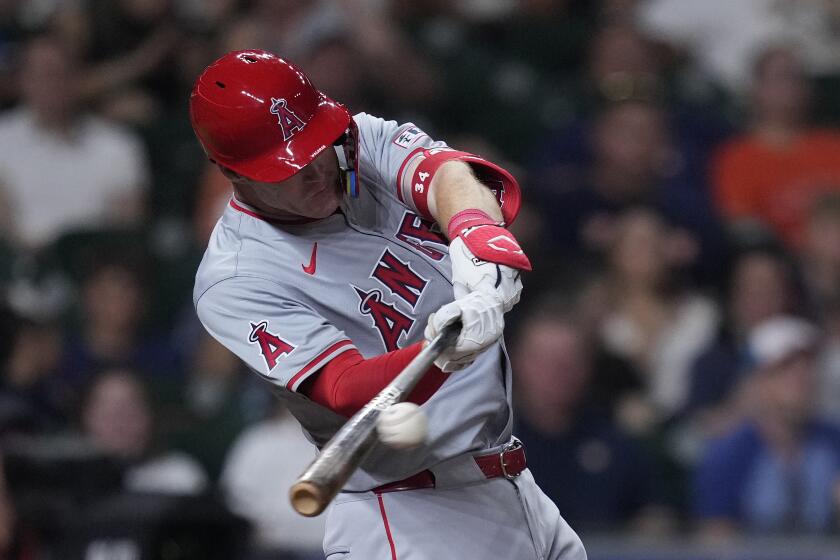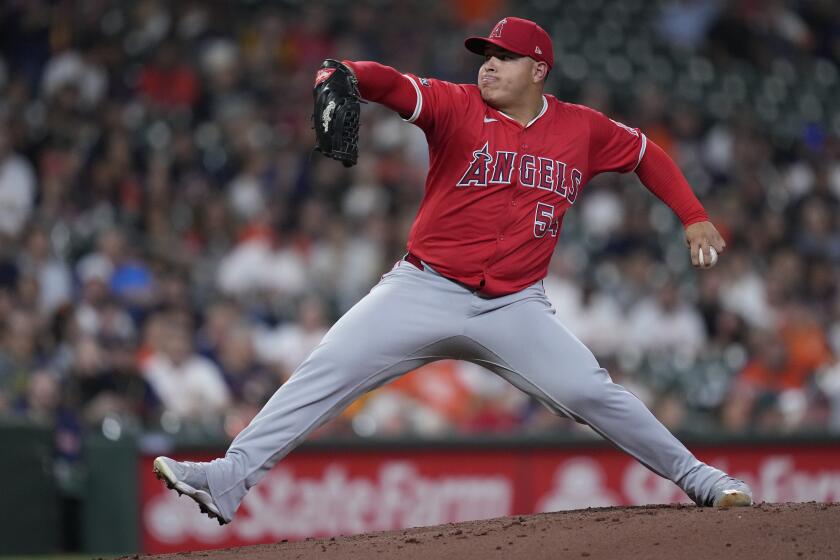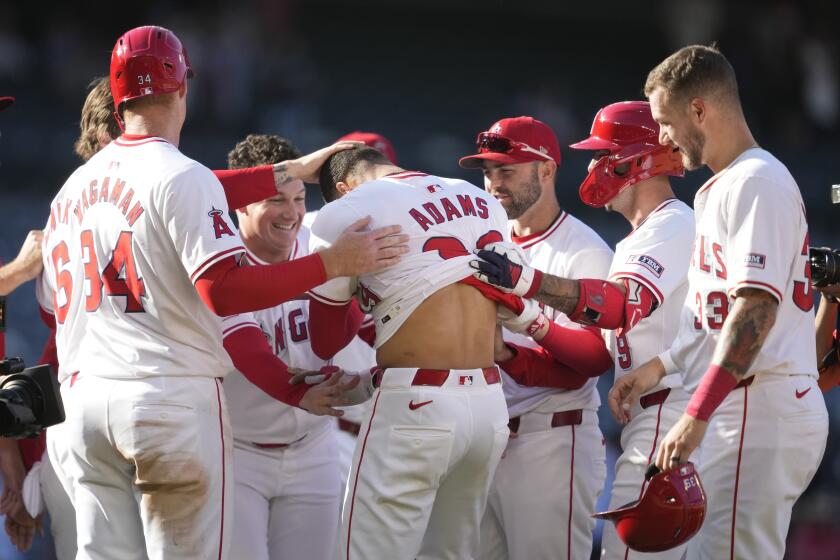Angels’ Venable Spends His Life on Baseball’s Bubble
He has not had his picture on a trading card since 1987. Such is the turn his vocation has taken. This is what typifies the baseball life and times of William McKinley Venable Jr., a nice little guy who clings to the profession like a necklace, reluctant to let go; an outgoing little outfielder who wears a charm on his jewelry in the shape of a baseball--which is, if you think about it, a rather charming charm for an unlucky ballplayer to wear.
“I think I’ve got one around here somewhere,” Max Venable says, gesturing into a cluttered locker at Anaheim Stadium, not altogether certain where those old bubble-gum cards of his have gone.
“Think you’ll be on one in 1991?” Max is asked.
“That’d be nice,” he says.
Poor Max. Forgotten, but not gone. It is his lot in life, at least for the time being. Thirty-three years old next week and here he is, still dreading every clubhouse rumor, every roster move, every whisper that might make him lug out his luggage again.
The Angels like having him around, sure. Everybody on every team he has ever been with has liked having Max Venable while he was around. It still doesn’t prevent the team from dealing for Luis Polonia one day, or Dave Winfield another day, further crowding an outfield where three’s already a crowd.
Perhaps you cannot feel too sorry for a man who will make a guaranteed $200,000 this fiscal year, in a society that equates wealth with well-being. Yet, what of next year? What awaits the venerable Max Venable when training camps spring to life and eager kids 10 years younger crave that last spot on the 40-man roster, or that invitation to leave Florida or Arizona with the two dozen individuals who have made the opening-day team? What then?
When you are William McKinley Venable Jr., you can’t help wondering. You wonder because not long ago you found yourself hiring on with a San Francisco construction crew and missing the entire 1988 major league season, figuring there’s no going back.
One day you poked into a closet and accidentally stumbled across one of your old bats, and you took it out, and took a swing, and told yourself “I can still do this.” So you started making telephone calls, and before long you found yourself in the company of a team in a Mexican league, playing outfield in the Yucatan, hanging around for close to two months, appearing in 13 games.
“How was it?” Max is asked.
“Oh, it wasn’t so bad,” he says, which says a lot.
Back in the big time, here in the Angel clubhouse, Venable is given a rare chance to start, and delivers three hits that include a well-swatted home run. He does his best not to get carried away by success. He understands that in this line of work, success can be temporary. Stay humble, make the most of it, think the least of it.
“I won’t play every day,” Venable is saying, clutching a cold bottle of beer, a reward that befits a night’s work against a team from Milwaukee. “I know that. I accept that. I accept my role. I enjoy my role. Somebody’s got to do it. Might as well be me.”
Secretly, maybe he imagines himself out there night after night, the way he did way back in the mid-1970s, when Venable signed his first professional contract and started 15 seasons of bounding from Bellingham to Clinton to Lodi to Shreveport to Phoenix to Indianapolis to Denver to Nashville to Edmonton, almost never spending a full year in one place. You have been to the Show, yes, but after all this time, the most hits you’ve had in a major league season is 50.
So, one morning you wake up and decide you have had enough, had your fill of the bus rides and bush leagues. “Mentally, I just had to get out,” you recall. “This game can really get to you.”
You turn 30 and things turn for the worse. Through the seasons of 1987-88, you get exactly seven big-league at-bats. One hit. One . No wonder you quit.
But now you are an adult, with adult responsibilities, three children among them, so you take what you can get. You phone your agent, who says the Angels might be interested. You call Bill Bavasi, director of minor league operations for the Angels, who promises nothing but a chance. Even at your advanced baseball age, you go play winter ball in some place called Azucareros, still trying to prove yourself.
You arrive at another spring camp, anxious that it could be your last. The Angels haul out the clauses. You will be paid an extra $10,000 if you play in 50 games or step up to the plate 90 times. Then another 10 grand for 70 games or 110 plate appearances. Not at-bats-- plate appearances. That is important contractual language to a player who cuts things close. Even if you walk, or bunt, or get hit by a pitch, it counts. And there’s $15,000 more for 85 games or 125 appearances.
“He’s something special, for a lot of reasons,” Angel Manager Doug Rader says. “When you consider the adversity he’s gone through, being out of baseball, being bounced around, emotionally Max rides the roller coaster year after year. Invariably when a roster move is made, he feels as though it might be him. Yet he still maintains all the positive qualities that make him such a fine person.”
Rader pencils him in. Venable gets 15 at-bats, eight hits. Clears the right-field fence. Returns to a dugout full of hugs and high-fives, players as happy for Max as Max is for Max.
“Yeah, I got a little excited,” Max is saying. “This doesn’t happen to me that much.”
Maybe it’ll happen again.
That’d be nice.
Go beyond the scoreboard
Get the latest on L.A.'s teams in the daily Sports Report newsletter.
You may occasionally receive promotional content from the Los Angeles Times.



